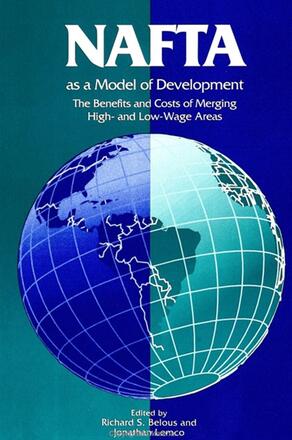
NAFTA as a Model of Development
The Benefits and Costs of Merging High- and Low-Wage Areas
Alternative formats available from:
Examines whether NAFTA will produce increased or decreased wages in the regional trading blocs emerging in Europe, North America, and East Asia as a result of its uniting of high and low wage areas and identifies the winners and losers in various labor markets.
Description
This book discusses the North American Free Trade Agreement (NAFTA) in terms of its implications for job creation, reduced tariffs, and increased investment. Although the regional trading blocs merging in Europe, North America, and East Asia differ strikingly, there is one basic feature common to each--the formation of regional trading blocs involves a uniting of high- and low-wage areas. The authors address this issue directly, questioning whether NAFTA will promote upward or downward convergence of compensation rates, unit labor costs, and benefit levels. Equally important, they consider whether this trading arrangement will promote economic growth, investment, and efficiency. Viewpoints from the U. S., Canada, and Mexico and from the business and labor communities are included.
Richard S. Belous is Vice President and Chief Economist at the National Planning Association and Adjunct Professor at George Washington University. Jonathan Lemco is Executive Director of the International Center for Family Enterprise, a Senior Fellow at the National Planning Association, and Adjunct Professor for Political Science at Johns Hopkins University-SAIS.
Reviews
"Appropriate for general audiences as well as for classes in economic development, political economy, and North American integration, this book could also be useful for courses in international economics because it describes so many important theoretical concerns. Most appealing is the explicit attention paid to NAFTA as the first major attempt at freer trade and investment between countries at such widely different stages of development. " -- Sarah Stevens, St. Lawrence University
"The book provides an excellent introduction to the debate of economic integration and its benefits as a model for development. It supplies a good overview of both negative and positive reactions to NAFTA, with about a third of the contributors in favor, a third neutral, and a third against. It is an evenhanded compilation of views on the subject by academics, business, and labor. " -- Gilbert R. Winham, Dalhousie University